- Home
- Brenda Janowitz
The Grace Kelly Dress Page 22
The Grace Kelly Dress Read online
Page 22
“How could I do that to Matthew?”
“We all make mistakes. Some are bigger than others.”
“I didn’t mean to do this to you.”
“You didn’t do anything to me,” her mother said. “People call off weddings all the time. There’s no shame in admitting that you’re not ready to get married.”
“I’m more lost than ever,” Joanie said, looking into her mother’s eyes.
“I think you know more than you’re letting on.” Her mother reached over for a tissue. She passed it to Joanie.
“I didn’t want to marry him,” Joanie said, pressing the tissue to her mouth, as if to hold the thoughts inside. “That’s the truth. And I don’t know why.”
“I’ll support you no matter what,” Birdie said. She leaned over and hugged her daughter. Joanie grabbed hold of her mother and squeezed tightly.
“Will this be the biggest mistake of my life?” Joanie asked into her mother’s shoulder. “The thing that defines me?”
“There’s no such thing as the biggest mistake,” her mother said. “There’s only what you do and what you don’t do. But you certainly should not get married only because you want to be married. You should only get married if you truly love the man. And only if you’re ready.”
“But if I don’t marry Matthew,” Joanie said, “how do I come back from that? What if I’m never ready? What if I never find someone again?”
“Not everything is right the first time,” her mother said carefully. “Take Grace Kelly’s wedding dress. Do you think that was the first design Helen Rose came up with?”
Joanie reached over for a tissue and dabbed at the corners of her eyes. She smiled. “The dress is utter perfection.”
“It took two tries to get it that perfect,” her mother said. “In 1952, Helen Rose created a dress for the actress Dorothy McGuire to wear for a wedding scene in the film Invitation.”
“We never saw that one,” Joanie said, thinking of all of the Sunday afternoons spent watching old movies with her mother.
“It looks very similar to the dress she made for Grace Kelly’s 1956 wedding. Wait here.” Birdie disappeared upstairs for a moment, and when she came back downstairs, she had a shoebox filled with old magazine clippings.
Joanie could hardly believe her eyes. It was just as her mother described—a first incarnation of the dress Grace Kelly would eventually wear down the aisle. The bodice of the dress was similar: the delicate neckline, the rose point lace overlay. The cummerbund. The skirt was slightly different: it had a bubble bustle on the sides and the back, as opposed to the clean lines that would become the trademark of the Grace Kelly dress.
Her mother was right—the same woman designed both dresses. And the second one was a more refined and elegant version of the first.
“I’d say Helen Rose got it right the second time, wouldn’t you?” Birdie asked.
Fifty-Seven
The seamstress
Paris, 1958
“Rose?”
Rose looked up from the book she was reading. It had become a habit—on Sunday afternoons, she would come to the Tuileries to sit on a park bench and read. She had grown to love the Tuileries Garden, and not just because it reminded her of Robert. Or rather, solely because it reminded her of Robert, of the time they had when his fiancée was away.
And now, he stood before her.
“Robert,” she said, by way of greeting. She was unsure of what was appropriate in this circumstance.
“It’s so lovely to see you,” he said, sitting down on the bench next to her.
“It’s lovely to be seen,” Rose said, shocked, her voice a whisper. When she looked back up to Robert, she held her tongue—she couldn’t possibly say all of the things she was feeling, inappropriate, all of it.
“I was so sorry that you left the ballet in such a hurry.”
“It was time for me to go. You understand.”
Robert nodded. He understood. “It’s a beautiful day,” he said, looking out at the grounds.
“It is,” Rose agreed, staring down at her hands.
Robert edged closer to her on the bench. He regarded Rose for a moment. “I’ve been thinking about you.”
“Oh,” Rose said, in place of all the other things she wanted to say, but wouldn’t dare utter. She would not tell Robert she had been thinking of him, too. She would not tell Robert she missed seeing him. And she certainly would not tell Robert she was in love with him.
“My mother told me that the dress is beautiful,” he said. “Even more beautiful than she could have imagined.”
“Thank you,” Rose said, her voice quiet and careful. “I appreciate that.”
Rose’s eyes teared up. Robert took a handkerchief from his jacket pocket and handed it to her. She dabbed carefully, so as not to disturb her mascara, and as she handed the handkerchief back to Robert, she noticed that it was not a handkerchief at all—it was a linen napkin, embroidered with the crest from the opera house.
She looked up at him, confused. “Is this from the opera house?”
“I wanted to remember the night, so I took a napkin home with me,” he said. “I hope you won’t tell.”
“I won’t tell.”
“I want to see you again.” With one finger, he brushed away a lock of hair that had blown into Rose’s face. His hand cupped her cheek, and he held it there for a moment. Rose closed her eyes at his touch, as if to memorize it. She brought her hand to his and held it.
“Robert?” a familiar voice called out, bringing Rose back to the present. She opened her eyes and saw that Robert had dropped his hand back into his lap. The spell had been broken. Rose turned her head to the source of the voice.
Elisabeth, Robert’s fiancée. His sister, Diana, stood next to her, mouth agape.
“What are you doing with my fiancé?”
Rose held her breath.
“I was heading over to the restaurant to meet you and I saw Rose sitting here alone,” Robert said, standing to greet them. “I sat down to say hello.”
“It looked to me like you were holding hands with the help,” Elisabeth said, her voice angry.
Shame flamed in Rose’s chest. She had forgotten her place. Her head dipped down, like when she was a child in the confession booth.
“Lovely to see you, Rose,” Diana said quietly.
“Lovely to see you, too,” Rose said, her voice small and uncertain. Rose silently cursed herself. She was supposed to be drumming up more business for the atelier, trying to keep it afloat. Trying to keep her job. Instead, her careless actions were threatening her very livelihood. If Elisabeth canceled her dress and alerted others to Rose’s behavior... Rose couldn’t even think of the repercussions.
“Robert,” Diana said, making a show of checking her delicate wristwatch. “We’re late for our lunch plans. I don’t want to keep Bertram waiting.”
“Let’s go,” Elisabeth said. And then, turning to face Rose: “Do be a dear and tell your boss that I won’t be buying a dress from your atelier, after all. Would you?”
“But I’m almost done with the final sketch,” Rose said, her voice choking on the words. “I know that you’ll love it.”
“I don’t think that I will,” Elisabeth said, walking off with her arm woven territorially through Robert’s.
Rose’s face fell. She tried to think of something to say, something that would reverse what had just happened, but she couldn’t think of a thing that would salvage the situation. She watched Elisabeth walk off. With the man she loved. With the dress commission the atelier desperately needed. How could she have done this? How could she have ruined everything?
Diana offered Rose a warm embrace before she joined Robert and Elisabeth. Her hug said, It will be all right, even though Rose knew that it would not. Julien would be furious with her. He’d warned her about Robert,
and now Elisabeth was canceling her dress contract. Could Diana be far behind?
Rose hurried home. She could no longer sit in the park, could no longer do things that reminded her of Robert. Could no longer think of him. It wasn’t right. He didn’t belong to her, just as the dress didn’t belong to her. Thinking about either one would only cause her pain.
As she arrived back at the boarding house, Rose was surprised to find Julien standing in the door frame. He looked distraught. His hair was mussed and his vest was unbuttoned.
Was it her? Was he cross with her? There was no way he could know that Rose had just bumped into the Laurents. No way to know that they’d lost the commission for Elisabeth’s dress. There had to be another reason for his visit.
“Is everything all right?” Rose asked carefully, after she had greeted her friend.
“It most certainly is not,” he said. Julien held out the newspaper for Rose to see, and pointed to the headline:
Acclaimed Dress Designer Madame Michel, Author of Creating the Illusion, Dead at Age 63
Fifty-Eight
The bride
Brooklyn, 2020
“I wasn’t expecting you.”
“May I come in?” Rocky asked.
“Yes, of course,” Joan said. “Come in.”
Rocky walked in and took a deep breath. She loved the scent of her childhood home. Even when her mother wasn’t cooking, it smelled like holiday. Like roasted garlic and rosemary and cinnamon. Joan led her to the family room and motioned for her to sit down.
“Tea? I was just making myself some chamomile, so—”
Joan turned toward the kitchen, but Rocky grabbed her mother and held her close. Joan had not been expecting the hug. But what could Rocky do? The second she saw her mother, it overcame her. This feeling of love, of appreciation.
“I’m so sorry. I’m sorry we fought. I’m sorry I didn’t tell you the truth sooner. I’m sorry I made you cry.”
“Oh, honey.” Joan brushed Rocky’s hair off her face—lavender this week—and pressed her lips to her forehead, the way she used to do when Rocky was a little girl and she was testing to see if Rocky had a fever. “You don’t have to be sorry.”
“I do.”
“Then, I accept your apology.”
The kettle screamed out, and Joan rushed into the kitchen. She met Rocky back at the couch with two cups of tea.
“I’m so sorry for everything.”
“I’ve already told you that it’s okay. I’m sorry for the way I reacted. I was just so taken off guard. But everything is fine.”
But Rocky couldn’t stop. Her thoughts came out in a jumble: “It’s not fine. I’m sorry for everything I said, the way I made you cry. I’m sorry I took you for granted. I’ll wear the dress.”
“It was never about the dress,” Joan said, her hand on Rocky’s face. “I wanted you to have it. It was something that was very important to me, and I gave it to you to mark the occasion. But you don’t have to wear it if you don’t want to.”
“So, you don’t want me to wear it?”
“Wear it. Don’t wear it. Use it for a tablecloth. It’s yours now. It belongs to you.”
Rocky furrowed her brow and tried to come up with a response. But she couldn’t think of a thing to say. Her mother took her hand and spoke: “This is not about me. It’s about you. It’s your wedding. Your day. But as you get older, I think you’ll come to see why these heirlooms are so important.”
“I don’t hold on to things. My life is about things that are new. Throwing out the old and replacing it with what’s current.”
“New is great. But sometimes the old stuff is meaningful, too. These things are a tie to our past, they remind us what is important.”
“And what’s that?” She honestly didn’t know. Rocky didn’t give much thought to things that were old. She never formed emotional connections to things. Never found it hard to leave behind something old once it was replaced with something newer, better. After all, why would you want outdated technology once there was an alternative?
“Love. Family,” Rocky’s mother said. “The care it took to make that dress means something. It is a reflection of how your grandmother felt about your grandfather, about how I felt about your father, about how you feel about Drew. It binds us together.”
“I get that, but what if the dress is just not me?”
“These things we hold on to, they are more than just things. They prove our history, who we are, where we came from.”
“So, you do want me to wear the dress.”
“The dress only means something if you want it to. What is important are the people behind it. When it comes to these things that are handed down from generation to generation, each woman leaves her own mark on it, so that it tells our story, stitch by stitch. Whether you decide to wear the dress is entirely up to you. But your grandmother and I want you to have the dress. The dress belongs to you. If you choose to keep it preserved in the back of your closet like you do the pearl necklace I gave you on your sixteenth birthday, that’s up to you.”
“I wear that necklace.”
Her mother laughed a deep, throaty laugh. “Oh, honey, it doesn’t matter if you wear it or not. That’s not what’s important. What is important is that you know how much I love you. How much your father loved you. Your whole family, in fact. And on your wedding day, we will stand proudly by your side as you marry the man you love. No matter what you’re wearing.”
Rocky looked at her mother. Her face, warm and open. Maybe she’d been right, maybe Rocky did have a wall up. But now, as she looked into the eyes of the second woman to wear the wedding gown, Rocky understood. This dress was a part of their family history. Part of where she came from. Part of who she was. “I’m going to wear the dress.”
“There is another option, of course.”
“What’s that?”
“You want something new.” Joan moved her fingers to look like a pair of scissors cutting. She sliced through the air with her hands, snip, snip. “So, make it into something new.”
“I could never do that to your dress. To Grand-mère’s dress.”
Joan laughed. “I don’t know how many different ways you want me to say it to you: the dress is yours. Do what you want to it.”
“But—”
“Do you think Grand-mère liked it when I took the sleeves off and put on the Princess Diana sleeves?”
Rocky regarded her mother. She hadn’t considered that. To her, her mother was the way she’d always been as long as she was born, a rule follower. A good girl. The sort of girl who would never disappoint her mother. It hadn’t occurred to her that Joan would ever do something that Grand-mère disapproved of.
Joan looked back at her daughter and smiled. “It’s yours now. Make it yours.”
Fifty-Nine
The mother of the bride, as a bride herself
Long Island, 1982
“Here, drown your sorrows in this,” Debbie said, passing a wine cooler over to Joanie. Joanie took the bottle from her friend and waited for the cabana boys to set up their beach chairs and umbrellas in the sand.
“I don’t deserve a wine cooler,” Joanie said, looking out at the ocean. Two weeks later, she had finally taken her mother up on her offer to spend a day at the beach club, and Debbie had taken the Long Island Rail Road out for the day to join her. “I don’t deserve anything. I can’t believe I did that to him.”
“I can’t believe you did that to yourself,” Debbie said, clear-eyed. “You had the guy, you had the ring, you had what every girl wants. Why would you throw that away? Tell him you made a mistake.”
The cabana boys finished setting up the chairs and smiled at Joanie. “Thank you,” she said, and gave the older one a tip.
“Now, this is heaven,” Debbie said, plopping herself down in a beach chair. She angled the umbrell
a so that her chair was completely in the sun.
“That’s the thing,” Joanie said, sitting down on her own chair. The umbrella covered her beach chair in shade. “I don’t think that I did make a mistake.”
“I’m telling you,” Debbie said, leaning back in her beach chair. “You made a mistake. Pass the baby oil.”
Joanie passed the bottle of baby oil and gazed out at the ocean. It was so vast, and so wide. It was beautiful, but it made Joanie feel small to look at it. There was this giant world out there, and there was so much of it that she hadn’t seen. So many things she had yet to experience.
“Earth to Joanie,” Debbie said, breaking her friend out of her spell. “Are you even listening to me? I said it’s not too late. Call him today. Tell him you were out of your right mind and will do anything to get him back. Anything.”
“I couldn’t go back even if I wanted to,” Joanie said, placing her wine cooler on the side table set up between their chairs. “He made that clear.”
“I’m sure that’s not true,” Debbie said, flipping her hair off her shoulders. The ends were drenched in the baby oil she’d slathered all over her body. “He still loves you, I know he does. And you still love him. You still want to marry him, right?”
Joanie thought about Debbie’s words. But she couldn’t think of an answer.
Debbie regarded her. “Oh.”
“Should we go into the ocean?” Joanie asked.
“You know I only want what’s best for you, right?”
Joanie took a deep breath of the salty ocean air. “I’m still trying to figure out what that is.”
“You know I’ll be there for you, no matter what, right?”
Joanie looked to her friend. “I do know that.”
Debbie hummed a few bars of the song “That’s What Friends Are For,” from the movie they’d just seen the previous weekend, Night Shift.
“I’m getting in the water. You coming?”
“I need to get a little more sun first,” Debbie said. “Then, when I feel like I’m about to burn, I’ll go into the water to cool down.”

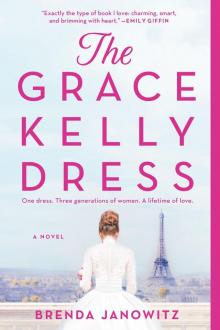 The Grace Kelly Dress
The Grace Kelly Dress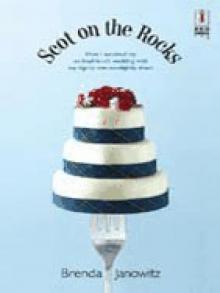 Scot on the Rocks
Scot on the Rocks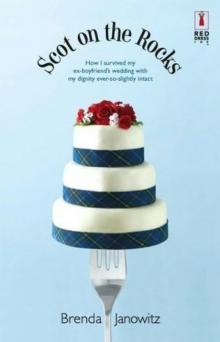 Scot on the Rocks bm-1
Scot on the Rocks bm-1 The Lonely Hearts Club
The Lonely Hearts Club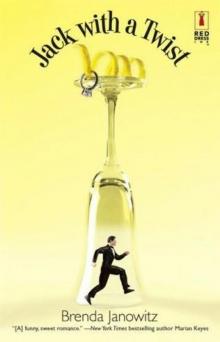 Jack With a Twist bm-2
Jack With a Twist bm-2 Based On A True Story (brooke miller)
Based On A True Story (brooke miller)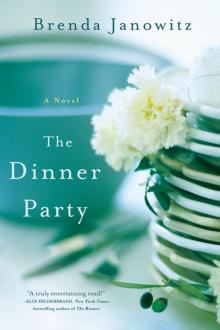 The Dinner Party: A Novel
The Dinner Party: A Novel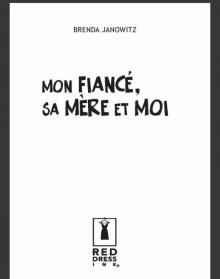 Mon fiancé, sa mère et moi
Mon fiancé, sa mère et moi Hollywood Punch
Hollywood Punch